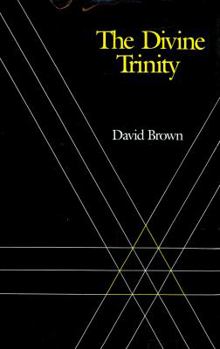Divine Trinity
Select Format
Select Condition 
Book Overview
This book, the first serious analysis of the doctrine of the Trinity for many years, presents a defense against the conservative treatment of the Trinity as an impenetrable ""mystery,"" and against... This description may be from another edition of this product.
Format:Hardcover
Language:English
ISBN:0875484395
ISBN13:9780875484396
Release Date:October 1999
Publisher:Open Court
Length:328 Pages
Weight:1.43 lbs.
Customer Reviews
1 rating
Provocative and engaging
Published by Thriftbooks.com User , 22 years ago
David Brown's The Divine Trinity represents a powerful attempt to meet critics of incarnational christology on their own ground. Brown argues that deist anti-incarnationalism is unstable--that it must be transformed either into a more robust theism or into straightforward atheism. After making the case for belief in an historically active God, he suggests the history of Jesus, even understood in relatively minimalist fashion, entails belief in the doctrine of the Incarnation. Basing his argument on the resurrection rather than on any feature of Jesus' practice or self-consciousness, he maintains that the exaltation evident in the resurrection disclosed Jesus as worthy of worship and that subsequent incarnational christology is best understood as an elucidation of the implications of these experiences. Then, he attempts to unpack the meaning of early Christian experience of the Holy Spirit, to the extent that we can retrieve it from the New Testament witness. He seeks to show that this experience points toward belief in the Spirit as in some sense personally distinct from both Jesus and the One to whom he prayed as Father.With the historical evidence out of the way, Brown examines the conceptual issues. He delineates two conceptual models for the Incarnation--kenotic and Chalcedonian--and concludes that both are coherent and consistent with the available historical evidence. By contrast, when he examines alternative unity and plurality models for the Trinity, he judges only the plurality model satisfactory.I wonder whether Brown has made as plausible a case as he thinks he has for social trinitarianism. While the social model is widely popular among orthodox Christians today, it seems to me to depend on the assumption that we know more than we do or could know about the inner life of God. I don't think Brown has made out his case that we can infer the appropriateness of this model from the NT evidence.More seriously, I worry about Brown's account of divine action. The deist accounts he rejects are inadequate to Christian faith and experience. But I think a satisfactory response to the problem of evil requires us to think of divine action as persuasive rather than coercive. Whether this is conceived of as a product of divine free choice or (as in process thought) as a consequence of the nature of reality doesn't matter; once we understand divine action in this way, we need to ask whether we can still maintain a view like Brown's. Austin Farrer articulated an essentially persuasive account of divine action while affirming an unequivocally high christology. But he left us fewer clues than he might have as to his grounds for believing himself entitled to do so. More work needs to be done here. (For those unconvinced by Farrer, John Cobb's winsome process christology remains available.)Other readers will doubtless find a variety of reasons to argue with Brown. But he has done a masterful job of integrating mainstream New Testament criticism, philosophi





